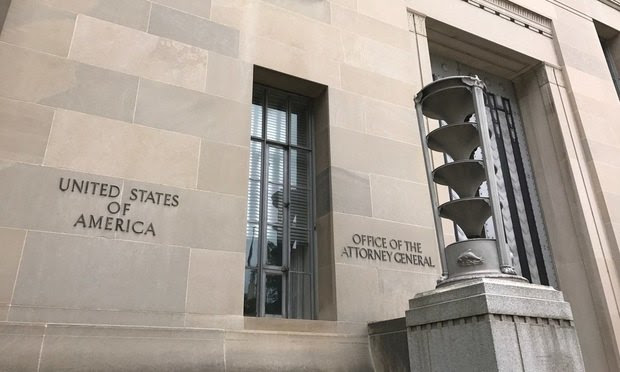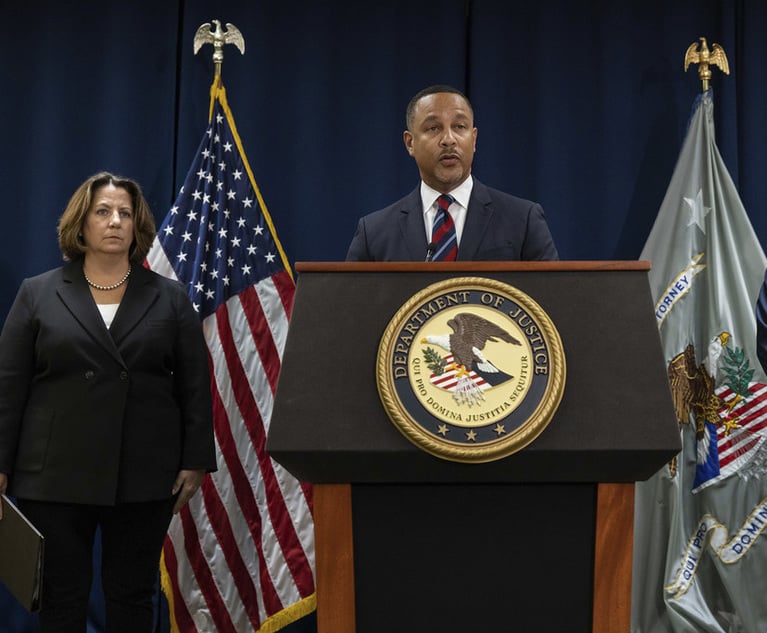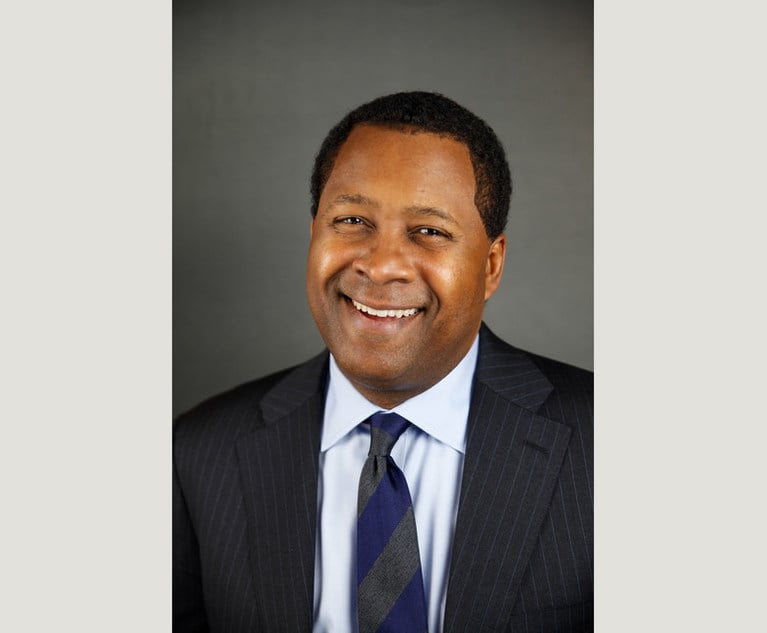Compliance Hot Spots: FARA Crackdown: What Law Firms Need to Know | Trump's Tweets? No Fear | Duke's $112M Fraud Settlement | Who Got the Work
Covington & Burling's out with a new advisory on the Foreign Agents Registration Act—and how the U.S. Justice Department could require greater disclosures soon. Plus: more analysis on the CFTC's efforts to combat foreign-bribery. Scroll down for Who Got the Work. Thanks for reading!
March 26, 2019 at 09:00 AM
10 minute read
The U.S. Justice Department's already making big moves on foreign-lobbying enforcement—we've got the details below. Plus: a Latham team has some insight on the CFTC's foreign-bribery moves, and scroll down for Who Got the Work, and our roundup of the latest big moves and announcements. Thanks for reading—and please continue to send feedback. I appreciate hearing about what's on your plate—observations, trends, new clients. I'm at [email protected] and 202-828-0315, or follow me on Twitter @cryanbarber.

FARA Maneuvering at Main Justice
In the latest sign of stepped up scrutiny of foreign influence efforts, the U.S. Justice Department has signaled it could soon require more detailed disclosures from lobbyists working in the United States for companies based overseas.
Lobbyists for foreign companies have long been able to avoid the more rigorous disclosure requirements of the Foreign Agents Registration Act by using an exemption that allows them to instead report their influence activities under the Lobbying Disclosure Act.
That exemption—commonly known as the LDA or commercial exemption—has been understood for years to be available to lobbyists so long as their advocacy was not principally benefiting a foreign government or political party.
But the Justice Department's enforcement of FARA is entering a new era.
 The DOJ's new advisory opinion, detailed in a recent blog post by Covington & Burling partners Rob Kelner and Brian Smith, providers further evidence that the FARA unit is tightening its fist. Kelner leads the firm's election and political law practice.
The DOJ's new advisory opinion, detailed in a recent blog post by Covington & Burling partners Rob Kelner and Brian Smith, providers further evidence that the FARA unit is tightening its fist. Kelner leads the firm's election and political law practice.
According to Covington's blog, the Justice Department sent its message in a footnote: “There are situations in which a foreign government or political party may not be the principal beneficiary, but a principal beneficiary of lobbying activities in which the LDA exemption would not apply.”
Kelner and Smith said the apparent narrowing of the exemption is “especially important to private sector companies, including U.S. subsidiaries of foreign corporations.”
“Although no court has ruled on the meaning of 'the principal beneficiary,' FARA practitioners generally have relied upon its plain meaning: The LDA exemption is not available if a foreign government or political party is the main beneficiary of the activities,” Kelner and Smith wrote.
Earlier DOJ regulations, according to the Covington team, were more stark: either the beneficiary of the advocacy was a foreign company or it was a government.
“We wonder whether the footnote indicates that the department is contemplating a new FARA rulemaking to replace 'the principal beneficiary' with 'a principal beneficiary.' If it does not, the new interpretation could be open to court challenge because it conflicts with the text of the regulation,” Kelner and Smith wrote.

Compliance Reads: Banks Using AI; No Longer Fearing Trump Tweets; Feds Win Tariff Case
>> CFTC Enters the Market for Anti-Corruption Enforcement. A team from Latham & Watkins, including partner Alice Fisher (above), a member of the firm's executive committee, offer a snapshot of what the Commodity Futures Trading Commission is doing on the foreign-bribery front. “With responsibility for prosecuting FCPA violations residing with the DOJ and SEC, the CFTC has surprised many in the industry by announcing that it will devote precious enforcement resources to foreign corruption,” the Latham team wrote in a post at NYU School of Law's Program on Corporate Compliance and Enforcement. [NYU Law]
>> Banks Use AI to Catch Rogue Traders Before the Act. “Imagine if, instead of being bogged down in 10,000 emails a day with words like 'fraud,' compliance teams could instead detect changes in tone and other subtle tics that show a trader's behavior is changing.” [Financial Times]
>> Trump Victorious in Court Case Against Steel Tariffs. “The U.S. Court of International Trade on Monday upheld the constitutionality of President Donald Trump's use of a law that he used to impose significant tariffs on imports of steel and aluminum tariffs for national security reasons.” [Politico] Read the decision by the International Trade Court. Legal scholar Steve Vladeck tweeted: “This is a significant but unsurprising ruling. The plaintiffs were not challenging whether the tariffs were justified by national security; instead they (unsuccessfully) argued that Congress had unconstitutionally delegated the power to make that decision to the president.” My colleague Tom McParland has more here.
>> Lawyers Should Engage with Engineers, Says Cisco's General Counsel. From Mark Chandler, chief legal officer and chief compliance officer for Cisco Systems: “Customer requirements and expectations these days far outstrip the legal requirements with respect to privacy. If you take a customer-centric approach, the legal compliance requirements should fall into place.” [Bloomberg Law]
>> How Companies Learned to Stop Fearing Trump's Twitter Wrath. “Despite Mr. Trump's efforts to compel companies to build and hire, they appear to be increasingly prioritizing their balance sheets over political backlash.” Gene Grabowski, a crisis communications specialist, said: “I don't think there's as much fear. At first it was a shock to the system, but now we've all adjusted. We take it in stride, and I think that's what the business community is doing.” [NYT]
>> SEC Wanted Muzzle on All of Elon Musk's Tesla Statements, Court Filing Says. “Regulators who sued Tesla Inc. Chief Executive Elon Musk last year for allegedly misleading investors with his tweets wanted the company to preapprove anything the executive said publicly about the auto maker. Mr. Musk didn't agree to the condition, saying his ability to freely talk about the company and its products was crucial to Tesla's success.” [WSJ] Read more at Bloomberg: Elon Musk's Fate Is in the Hands of This Federal Judge. “The question of whether Tesla Inc. CEO Elon Musk is in contempt of court for recent tweets falls to Alison Nathan, a federal judge in Manhattan appointed by former President Barack Obama.”
>> As Social Media Platforms Up Their Fintech Offerings, Regulatory Challenges Await. “The idea of 'move fast and break things' doesn't work as well when you're in a highly regulated [industry],” said Rebecca Simmons, a partner in Sullivan & Cromwell's financial services and capital markets groups. “So we do see people sometimes surprised at the amount of time it takes.” [The Recorder]

Who Got the Work
>> The law firms Gentry Locke Rakes & Moore; Healy Hafemann Magee & Thomas; and Brooks, Pierce, McLendon, Humphrey & Leonard represented whistleblower Joseph Thomas in a case against Duke University that has settled for $112.5 million. Read the U.S. Justice Department's statement here, and my colleague Sue Reisinger has more. Thomas, a former Duke University lab employee, will receive $34 million. Duke, which said it would enact compliance reforms, said in a statement: “This is a difficult moment for Duke. This case demonstrates the devastating impact of research fraud and reinforces the need for all of us to have a focused commitment on promoting research integrity and accountability.” Duke was represented by lawyers from Womble Bond Dickinson; Reed Smith; and Norton Rose Fulbright.
>> Fujian Jinhua Integrated Circuit Co., Ltd. selected Brownstein Hyatt Farber Schreck to serve as government relations advisors to Kobre & Kim LLP with respect to the firm's legal representation of the company, according to new filingsmade under the federal Foreign Agents Registration Act. The company agreed in January to pay $85,000 monthly. Brownstein Hyatt said it “will provide federal government relations services to Kobre on behalf of Jinhua. These services are in connection with and in anticipation of certain legal proceedings.”
>> “Covington & Burling, Skadden, and Nixon Peabody have joined a growing number of Big Law firms that have signed on to represent defendants in the college bribery scandal, bringing the number of major firms involved to at least 13,” Bloomberg Law reports. A Ropes & Gray team is on the defense for Gordon Caplan, the Willkie Farr partner who's been charged in the scandal.
>> Marriott has hired a Brownstein Hyatt team to lobby on “tax and regulatory parity for lodging providers and facilitators, work related to their properties in Cuba,” according to a new registration. The nine-person team includes Russ Sullivan, former Senate Finance Committee staff director; David Reid, senior policy advisor; and Nadeam Elshami, former chief of staff to U.S. Rep. Nancy Pelosi.

Notable Moves & Announcements
• Jeff Taylor (above) has been named chief litigation counsel at Fox Corporation. Taylor, reporting to Viet Dinh, chief legal and policy officer, will oversee litigation, labor and employment and compliance. Taylor recently served as deputy general counsel and chief compliance officer for General Motors Co. He joined General Motors in 2015 from Raytheon, where he had been general counsel. My colleague Philip Bantz has more here at Corporate Counsel.
• Paul Ray, deputy administrator of the Office of Information and Regulatory Affairs, is the acting head now, succeeding newly confirmed D.C. Circuit Judge Neomi Rao. Ray joined the U.S. Labor Department in 2017 from Sidley Austin, where he was an associate. Read his financial disclosure here.
• “Proskauer has lost some 20 attorneys to Kirkland & Ellis in Los Angeles, including the West Coast head of its corporate and securities practice, as Kirkland launches a new transactional team. Michael Woronoff, who also helped run the private equity and M&A group at Proskauer, will lead the new team at Kirkland along with partners Monica Shilling, Philippa Bond, Jonathan Benloulou, Anne Kim, and Chris Wu,” Bloomberg Law reports. My colleague Meghan Tribe has more.
• Former Nevada attorney general Adam Laxalt has joined litigation boutique Cooper & Kirk, where he will split time between Nevada and the firm's home office in Washington, my colleague Ryan Lovelace reports.
• Anne Salladin, a former senior counsel in the U.S. Treasury Department's office of assistant general counsel for international affairs, has joined Hogan Lovells' international trade practice as a partner in Washington.
• Seth DuCharme, former head of the criminal division in the Eastern District of New York, is joining the staff of U.S. Attorney General William Barr, my colleague Colby Hamilton reports. Succeeding DuCharme is Jacquelyn Kasulis, who'll serve as acting criminal division chief. The former Kirkland & Ellis litigation associate joined EDNY in 2008.
• Mark Mandel, a securities litigator, has joined Troutman Sanders as a partner in the firm's New York office. Mandel formerly was New York chief of the U.S. Securities and Exchange Commission's division of broker-dealer enforcement, and he previously practiced at Hunton Andrews Kurth.
• Marc Mukasey and two other former shareholders from Greenberg Traurig have launched a new boutique law firm in New York called Mukasey Frenchman & Sklaroff. The boutique's partners include Mukasey, Robert Frenchman and Jeffrey Sklaroff.
• Roland Steinmeyer and Patrick Späth have joined Morrison & Foerster's investigations and white-collar practice in Berlin.
This content has been archived. It is available through our partners, LexisNexis® and Bloomberg Law.
To view this content, please continue to their sites.
Not a Lexis Subscriber?
Subscribe Now
Not a Bloomberg Law Subscriber?
Subscribe Now
NOT FOR REPRINT
© 2025 ALM Global, LLC, All Rights Reserved. Request academic re-use from www.copyright.com. All other uses, submit a request to [email protected]. For more information visit Asset & Logo Licensing.
You Might Like
View All
Compliance Hot Spots: GOP Eyes ESG as an Antitrust Issue + Another DOJ Crypto Seizure + Sidley Partner Jumps to Main Justice
9 minute read
Compliance Hot Spots: Lessons from Lafarge + Fraud Section Chief Talks Compliance + Cravath Lands FTC Commissioner
11 minute readTrending Stories
- 1New York-Based Skadden Team Joins White & Case Group in Mexico City for Citigroup Demerger
- 2No Two Wildfires Alike: Lawyers Take Different Legal Strategies in California
- 3Poop-Themed Dog Toy OK as Parody, but Still Tarnished Jack Daniel’s Brand, Court Says
- 4Meet the New President of NY's Association of Trial Court Jurists
- 5Lawyers' Phones Are Ringing: What Should Employers Do If ICE Raids Their Business?
Who Got The Work
J. Brugh Lower of Gibbons has entered an appearance for industrial equipment supplier Devco Corporation in a pending trademark infringement lawsuit. The suit, accusing the defendant of selling knock-off Graco products, was filed Dec. 18 in New Jersey District Court by Rivkin Radler on behalf of Graco Inc. and Graco Minnesota. The case, assigned to U.S. District Judge Zahid N. Quraishi, is 3:24-cv-11294, Graco Inc. et al v. Devco Corporation.
Who Got The Work
Rebecca Maller-Stein and Kent A. Yalowitz of Arnold & Porter Kaye Scholer have entered their appearances for Hanaco Venture Capital and its executives, Lior Prosor and David Frankel, in a pending securities lawsuit. The action, filed on Dec. 24 in New York Southern District Court by Zell, Aron & Co. on behalf of Goldeneye Advisors, accuses the defendants of negligently and fraudulently managing the plaintiff's $1 million investment. The case, assigned to U.S. District Judge Vernon S. Broderick, is 1:24-cv-09918, Goldeneye Advisors, LLC v. Hanaco Venture Capital, Ltd. et al.
Who Got The Work
Attorneys from A&O Shearman has stepped in as defense counsel for Toronto-Dominion Bank and other defendants in a pending securities class action. The suit, filed Dec. 11 in New York Southern District Court by Bleichmar Fonti & Auld, accuses the defendants of concealing the bank's 'pervasive' deficiencies in regards to its compliance with the Bank Secrecy Act and the quality of its anti-money laundering controls. The case, assigned to U.S. District Judge Arun Subramanian, is 1:24-cv-09445, Gonzalez v. The Toronto-Dominion Bank et al.
Who Got The Work
Crown Castle International, a Pennsylvania company providing shared communications infrastructure, has turned to Luke D. Wolf of Gordon Rees Scully Mansukhani to fend off a pending breach-of-contract lawsuit. The court action, filed Nov. 25 in Michigan Eastern District Court by Hooper Hathaway PC on behalf of The Town Residences LLC, accuses Crown Castle of failing to transfer approximately $30,000 in utility payments from T-Mobile in breach of a roof-top lease and assignment agreement. The case, assigned to U.S. District Judge Susan K. Declercq, is 2:24-cv-13131, The Town Residences LLC v. T-Mobile US, Inc. et al.
Who Got The Work
Wilfred P. Coronato and Daniel M. Schwartz of McCarter & English have stepped in as defense counsel to Electrolux Home Products Inc. in a pending product liability lawsuit. The court action, filed Nov. 26 in New York Eastern District Court by Poulos Lopiccolo PC and Nagel Rice LLP on behalf of David Stern, alleges that the defendant's refrigerators’ drawers and shelving repeatedly break and fall apart within months after purchase. The case, assigned to U.S. District Judge Joan M. Azrack, is 2:24-cv-08204, Stern v. Electrolux Home Products, Inc.
Featured Firms
Law Offices of Gary Martin Hays & Associates, P.C.
(470) 294-1674
Law Offices of Mark E. Salomone
(857) 444-6468
Smith & Hassler
(713) 739-1250










